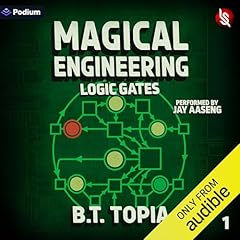
Silicon
From the Invention of the Microprocessor to the New Science of Consciousness
No se pudo agregar al carrito
Add to Cart failed.
Error al Agregar a Lista de Deseos.
Error al eliminar de la lista de deseos.
Error al añadir a tu biblioteca
Error al seguir el podcast
Error al dejar de seguir el podcast
 Exclusivo para miembros Prime: ¿Nuevo en Audible? Obtén 2 audiolibros gratis con tu prueba.
Exclusivo para miembros Prime: ¿Nuevo en Audible? Obtén 2 audiolibros gratis con tu prueba.Compra ahora por $20.88
-
Narrado por:
-
Mark Bramhall
-
De:
-
Federico Faggin
“As soon as she heard me enter, Elvia awoke from a light sleep that had overcome her as she anxiously waited: ‘How did it go?’ Excited, I exclaimed, ‘It works!’ We embraced, almost overwhelmed with feelings of euphoria and happiness, aware that something epochal had happened. On that cold January night of 1971, the world’s first microprocessor was born!”
The creation of the microprocessor launched the digital age. The key technology allowing unprecedented integration, and the design of the world’s first microprocessor, the Intel 4004, were the achievement of Federico Faggin. Shrinking an entire computer onto a tiny and inexpensive piece of silicon would come to define our daily lives, imbuing myriad devices and everyday objects with computational intelligence.
In Silicon, internationally recognized inventor and entrepreneur Federico Faggin chronicles his “four lives”: his formative years in war-torn Northern Italy, his pioneering work in American microelectronics, his successful career as a high-tech entrepreneur, and his more recent explorations into the mysteries of consciousness. In this heartfelt memoir, Faggin paints vivid anecdotes, walks listeners through society-changing technological breakthroughs, and shares personal insights, as each of his lives propels the next.
©2020 Federico Faggin (P)2021 Federico FagginLos oyentes también disfrutaron:




















Las personas que vieron esto también vieron:











This is great!
Se ha producido un error. Vuelve a intentarlo dentro de unos minutos.
Great half-book
Se ha producido un error. Vuelve a intentarlo dentro de unos minutos.
Mind-banding book
Se ha producido un error. Vuelve a intentarlo dentro de unos minutos.
The Revolution Continues
Se ha producido un error. Vuelve a intentarlo dentro de unos minutos.
Modern Ground Breaking and Historically important
Se ha producido un error. Vuelve a intentarlo dentro de unos minutos.


